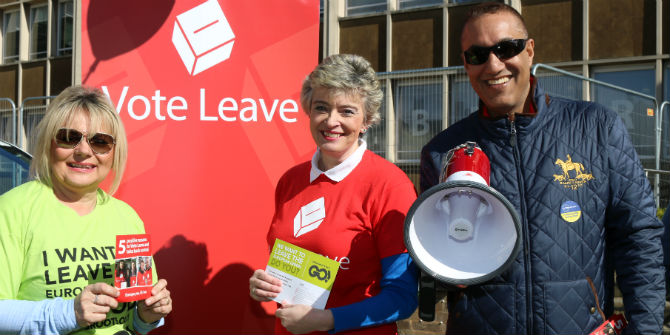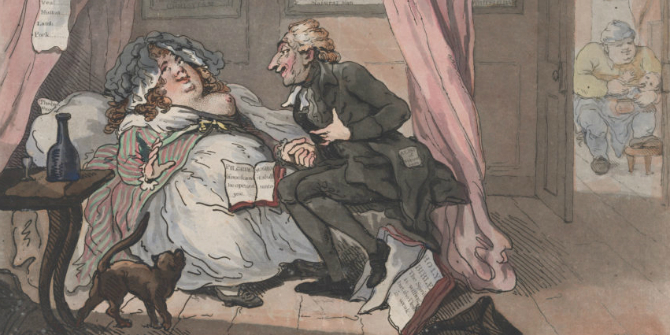 Why do we persist in holding the ‘white working class’ accountable for Brexit and Donald Trump’s win, when the evidence suggests it was the backing of the white middle classes that secured them? Gurminder K Bhambra (University of Sussex) argues that a pervasive ‘methodological whiteness’ has distorted social scientific accounts of both these elections. It has enabled commentators to offer economic disadvantage as an explanation for the results, conveniently overlooking the fact that ethnic minorities did not vote Leave – nor African-Americans and Hispanics vote for Trump – in significant numbers, despite the fact that they themselves constitute a large proportion of the working-class.
Why do we persist in holding the ‘white working class’ accountable for Brexit and Donald Trump’s win, when the evidence suggests it was the backing of the white middle classes that secured them? Gurminder K Bhambra (University of Sussex) argues that a pervasive ‘methodological whiteness’ has distorted social scientific accounts of both these elections. It has enabled commentators to offer economic disadvantage as an explanation for the results, conveniently overlooking the fact that ethnic minorities did not vote Leave – nor African-Americans and Hispanics vote for Trump – in significant numbers, despite the fact that they themselves constitute a large proportion of the working-class.
When the result of the referendum on membership in the EU was announced in the UK, many commentators immediately announced that it had been delivered by the ‘left-behind’ white working class. The equivalent constituency in the US was subsequently argued to have secured Trump the presidency. Yet in both places it has been demonstrated that the white working class vote was less significant than that of the white middle class.
In the context of Brexit, for example, Danny Dorling suggests that most people who voted ‘Leave’ lived in the south of England and the majority were in the middle classes. Lorenza Antonnuci and colleagues similarly argue that the result was delivered more by the ‘squeezed middle’ than the working class. In the US, data from the Pew Research Centre suggests, it was middle class communities that overwhelmingly shifted to Trump in 2016 and were largely responsible for his victory.
So the question needs to be asked: why is the white working class being held responsible for decisions taken by the white middle classes?

One explanation, I suggest, is in order to deflect consideration of race in the motivations of the vote. If the white working class had voted disproportionately for Brexit or Trump then the racism implicit in such a response could potentially be mitigated by economic reasoning – they are not fundamentally racist, they are concerned about their jobs, living conditions, etc. If we accept that the white middle class have disproportionately voted for Brexit and Trump, then it is less plausible to deflect consideration of race on the basis of the same presumed economic anxieties, and a more serious conversation on race would need to ensue. But why did many academic commentators miss this?
‘Methodological whiteness’, I suggest, is a way of reflecting on the world that fails to acknowledge the role played by race in the very structuring of that world, and of the ways in which knowledge is constructed and legitimated within it. It fails to recognise the dominance of ‘whiteness’ as anything other than the standard state of affairs and treats a limited perspective – that deriving from white experience – as a universal perspective. At the same time, it treats other perspectives as forms of identity politics explicable within its own universal (but parochial and lesser than its own supposedly universal) understandings.
In effect, ‘methodological whiteness’ entails a denial of its own politics of identity and constitutes the standard social scientific discussion of race – which tends to understand it primarily in terms of issues of identity or inequality applying to the situation of non-white others. In contrast, I want us to understand both the ways in which race, as a structural process, has organised the modern world and the impact that this has had on our ways of knowing the world.
To discuss the ‘left behind’ simply in terms of the white working class, and to rationalise their vote for Brexit and Trump in terms of their economic position, conflates socio-economic position with racialised identity while claiming to speak only about class and to repudiate identity politics. If class was the key issue at stake for academics and media commentators then there would also have been reflection on the fact that ethnic minorities in the UK, and African Americans and Hispanics in the US – who disproportionately constitute the category of the ‘working class’ – voted neither for Brexit, nor for Trump in any significant number.
This post represents the views of the author and not those of the Brexit blog, nor the LSE. It draws on ‘Brexit, Trump and ‘methodological whiteness’: on the misrecognition of race and class’, British Journal of Sociology.
Gurminder K Bhambra is Professor of Postcolonial and Decolonial Studies across the Departments of Geography and International Relations in the School of Global Studies, University of Sussex.







This makes no sense. EU citizens are largely the same ‘race’ as the British middle classes. So drawing the conclusion that racism was responsible for the vote is nonsense.
None of my friends and family who voted OUT are ‘Working Class’ – neither am I. But we could all see where the EU is leading us and said NO! I suspect that a lot of those who voted OUT, although not specially knowledgeable about the EU, recognise a bad smell when they smell it. Call it a hunch. Call it intuition. It doesn’t matter – they were correct.
To the extent that race is relevant, it is the race-baiters of identity politics who have made it so. The most recent manifestation makes this very clear in a nutshell: the poppy is now a sign of ‘white supremacy’. How did that happen? Muslim extremists who hate Britain projected their hatred onto the poppy. Anybody who did not fall into line with the offended minority and abandon the poppy instantly became a racist. Well the race-baiters can stuff it up their jumper. They wanted identity politics; they created it; they own it.
The argument seems to be mainly one that working class ethnic minorities did not vote Leave or for Trump. That is true but it does not mean the white working class did not.
In the US Trump won white no college graduates 67% to 28%, compared to white graduates who he won 49% to 45%. Non-white non college graduates went for Hillary 75% to 20% and non white graduates by 71% to 23%. On income the argument that it was the lower middle class which won it for Trump has more ground with Hillary winning those earning under $30k by 53% to 41% and those on $30 to 50k by 51% to 42%. Trump won those on $50k to $100k by 50% to 46%, those on $100k to $200k by 48% to 47%, those on $200k to 250k by 49% to 48% and those on more than $250k by 48% to 46%
https://en.wikipedia.org/wiki/United_States_presidential_election,_2016
In the EU referendum BME voters voted Remain by 69% to 31% while white voters voted Leave by 54% to 46%. Upper middle class ABs voted Remain 59% to 41%, lower middle class C1s voted Remain by 52% to 48%, skilled working class C2s voted Leave by 62% to 38% and unskilled working class and unemployed DEs voted Leave by 64% to 36%. So clearly it was the white working class which won it for Leave in the UK.
https://www.ipsos.com/ipsos-mori/en-uk/how-britain-voted-2016-eu-referendum
Maybe the statisticians and the media/other people have different definition of “working class” and “middle class”. Maybe the college educated middle class considers non college educated middle class as “working class”.
The figures they are using show that in predominantly working class areas a higher percentage of people voted to leave. This does still suggest that given the context of the people (loosely and uninformatively labelled the North and South) the context of northerners made them more likely to want to vote to leave. Her interpretation focusing on either race or class (understandable since they are the dominant narratives) still misses all the other nuances of people voting. No doubt many people from different ‘classes’ or ‘races’ actually voted for virtually identical reasons. I see looking at blame as really a waste of time. Clearly there are issues around race categories which set people against each other. Equally obviously there are issues around economic and social/cultural structures that create disparities in the levels of opportunity, education, involvement in the creation of culture, corporate/organisational and political leadership. Both need to be dealt with. To act like race is being left out of the discussion about why Brexit and Trump happened is totally ridiculous. It would be much more revealing to look at all the other issues beyond race and class that have a huge effect. Most pressingly what the hell are we going to do about it before the country slides into oblivion? Wasting time on purely academic debate and critique with no practical import.
The working class did vote disproportionately for Brexit, and middle class did vote disproportionately for Remain – precisely the opposite of what the article asserts. Because the middle class vote in total was significantly higher than that defined as working class in these categorisations, it is quite conceivable that the majority of Brexit votes were classified as middle class.
‘…..conveniently overlooking the fact that ethnic minorities did not vote Leave … in significant numbers’. Around 30% of BAME voters voted Leave. That is significant.
It is true that the proportion of the black American vote for Trump was astoundingly low – around 8%. However, that percentage is fairly typical looking back a number of decades – it is not specific to Trump. 30% of Hispanic voters voted for Trump, a little higher than the previous Hispanic Republican vote. That is not insignificant at all, nor is it obvious from these figs that it is a ‘Trump’ phenomenon as opposed to a more general one.
‘Why is the white working class being held responsible for decisions taken by the white middle classes?’ They are only being ‘held responsible’ by Remain campaigners.
The idea that the Brexit vote reflects atavistic tendencies linked to colonialism is flawed IMO. Not only is there very little evidence for this in the general population, but it fails to root populism in a reaction to the failure of an increasingly distant, technocratic politics and elite. There is plenty of evidence for this throughout Europe and the USA.
That does not at all rule out race as an issue, but it is clearly a common issue across European and at the level of the EU also. The attempts, constantly, to equate Brexit with race, avoids the issue that was on the ballot paper – membership of a trade / political body. The EU’s own research (EU barometer) indicates there is nothing exceptional about the UK compared to other EU countries with regards to attitudes to immigration, and that there is no general growth of xenophobia (the figs covering the relevant time period suggest the opposite).
‘Methodological whiteness’ ? There are good / appropriate methodologies (and we can argue about what they are in any given case) and there are bad / inappropriate ones. If they are bad, it is often because they do not aim to uncover truths but reaffirm prejudices.
– because the white working class were feeling the hit the most. They are the ones that are getting hammered the most by the open door from europe. Wages, housing, social services etc.
Work creates wealth, not speculating on the stock exchange then wafting home in a Bentley to a wealthy suburb in london or the shires.
.
Does not matter who voted for brexit. The fact is msjority did.ln an unequal world this vote maintained equallity
One of the highest ethnic minority wards in London, Osterley Ward in Hounslow voted Leave. Ethnic Minorities in Bradford, Birmingham and Luton did too. The premise of this is entirely flawed, and you’ve picked these conclusions based entirely on your own prejudices.